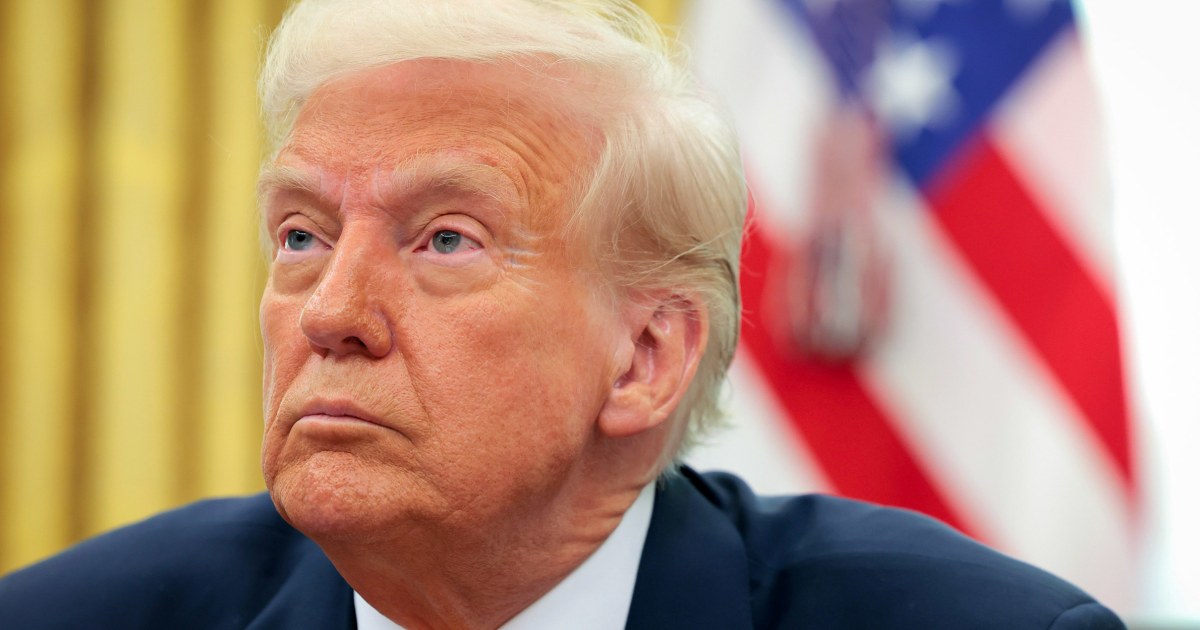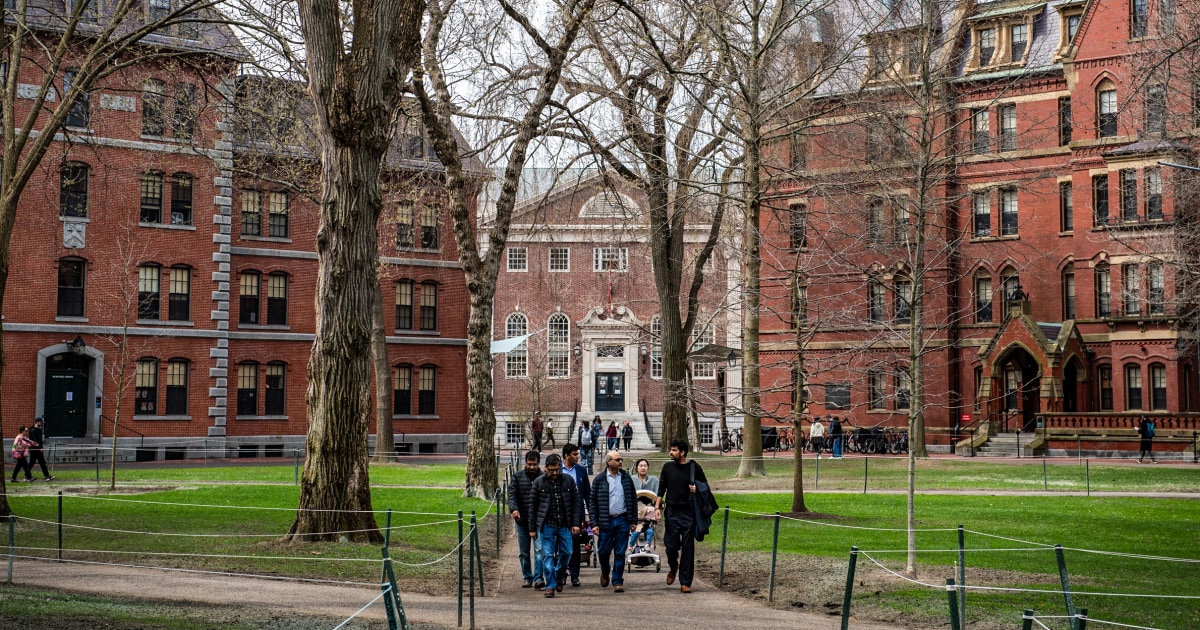Education
Trump set to sign executive order shuttering the Education Department

President Donald Trump is expected to sign an executive order Thursday to close the Education Department, fulfilling a yearslong pledge to dismantle the federal agency, the White House confirmed.
Trump will hold an event at the White House to sign the order directing Education Secretary Linda McMahon to “take all necessary steps to facilitate the closure the Department of Education and return education authority to the States, while continuing to ensure the effective and uninterrupted delivery of services, programs, and benefits on which Americans rely.”
USA Today first reported that Trump will sign the order Thursday.
Follow live politics coverage here
Formally closing the department requires an act of Congress. But even without formally shutting it down, the Trump administration could effectively make it nearly impossible for employees to carry out their work, as it has done with the U.S. Agency for International Development.
President Jimmy Carter established the department in 1979 after Congress passed the Department of Education Organization Act in bipartisan votes.
McMahon recently moved to drastically reduce the size of the Education Department by cutting its workforce in half. She called the job terminations the first step toward shutting down the department.
“That was the president’s mandate,” McMahon said last week in an interview with Fox News. “His directive to me, clearly, is to shut down the Department of Education, which we know we’ll have to work with Congress, you know, to get that accomplished.”
McMahon similarly vowed at her Senate confirmation hearing to work with Congress to advance Trump’s plan to dismantle the department. She telegraphed in an email to employees this month that major changes were coming.
“Our job is to respect the will of the American people and the President they elected, who has tasked us with accomplishing the elimination of bureaucratic bloat here at the Department of Education—a momentous final mission—quickly and responsibly,” she wrote, according to a copy obtained by NBC News.
The Senate confirmed McMahon in a 51-45 vote. No Democrat voted for her.
Trump has suggested that he could garner enough congressional support to formally close the department, characterizing teachers unions as more of a threat to the plan than lawmakers.
“I think I’d work with Congress,” Trump said last month in the Oval Office. “We’d have to work with the teachers union, because the teachers union is the only one that’s opposed to it.”
It is unclear whether Trump has secured the support of any Democratic lawmakers, many of whom have balked at his efforts on that front.
Sen. Patty Murray, D-Wash., the top Democrat on the Appropriations Committee, accused Trump and Elon Musk, the de facto head of the Department of Government Efficiency, of “robbing our students and families of critical funding.”
“The effects of Trump and Musk’s slash and burn campaign will be felt across our state—by students and families who suffer from the loss of Department staff working to ensure their rights under federal law, school districts who have to lay off teachers, students who can’t get the help they need to get financial aid, and families who get ripped off because the watchdogs were fired,” Murray said in a statement Wednesday night. “This issue is personal for me, and for every single family. We cannot relent in this fight.”
A coalition of 21 Democratic attorneys general filed a lawsuit last week arguing any attempt by Trump to eliminate the department is unlawful.
“Because neither the President nor his agencies can undo the many acts of Congress that authorize the Department, dictate its responsibilities, and appropriate funds for it to administer, the President’s directive to eliminate the Department of Education—including through the March 11 decimation of the Department’s workforce and any other agency implementation—is an unlawful violation of the separation of powers, and the Executive’s obligation to take care that the law be faithfully executed,” the lawsuit reads.
The Education Department is one of the smallest Cabinet-level departments. Its $268 billion appropriations last year represented 4% of the U.S. budget.
The department does not dictate curricula used in classrooms. It is largely a funding and civil rights enforcement organization, distributing money for schools with high rates of impoverished students and to assist children with disabilities.
It also runs the public student loan program, which has more consumer protections and lower interest rates than private education loan programs.
Trump’s executive order will direct McMahon to ensure the agency’s funds do not go toward programs or activities that advance diversity, equity and inclusion goals or gender ideology.
The Education Department last week announced investigations into more than 50 universities it accused of “engaging in race-exclusionary practices in their graduate programs.”
Diversity, equity and inclusion, or DEI, is a widely used label applied to efforts to improve workplace culture and create more opportunities for disadvantaged groups, and they are not inherently discriminatory.
National Education Association President Becky Pringle said in a statement Wednesday that Trump’s effort to close the Education Department could have disastrous implications for students across the country.
“If successful, Trump’s continued actions will hurt all students by sending class sizes soaring, cutting job training programs, making higher education more expensive and out of reach for middle class families, taking away special education services for students with disabilities, and gutting student civil rights protections,” Pringle said in a statement.
She accused Trump and Musk of aiming “their wrecking ball at public schools and the futures of the 50 million students in rural, suburban, and urban communities across America to pay for tax handouts for billionaires.”
McMahon said last week that at least three DOGE staffers had been auditing the Education Department.
Keri Rodrigues, the president of the National Parents Union, said dismantling the department would disproportionately affect the most vulnerable communities.
“Let’s be clear: Before federal oversight, millions of children—particularly those with disabilities and those from our most vulnerable communities—were denied the opportunities they deserved,” Rodrigues said in a statement Wednesday night. “The Department of Education was created to ensure that every child, regardless of background or zip code, has access to a public education that prepares them for their future. Eliminating it would roll back decades of progress, leaving countless children behind in an education system that has historically failed the most marginalized.”
Trump has long pledged to dismantle the Education Department, first mentioning the idea during his previous term and campaigning on the promise extensively throughout the 2024 election. He has suggested that states should take over administering educational policy and that other parts of the federal government could absorb current agency responsibilities, like overseeing federal student loans.
“Your state is going to control your children’s education. We’re moving it out of Washington immediately,” Trump said at a campaign event last year in Saginaw, Michigan. “We’re going to do that very fast, and it’s going to be great.”
Education
Judge orders detained Tufts student Rumeysa Öztürk to be transferred back to Vermont

A federal judge on Friday ordered that the Tufts University student who wrote an essay about Israel and the war in Gaza and is now fighting deportation must be transferred back to Vermont.
Judge William K. Sessions III stayed his order for four days to give the government a chance to appeal.
Rumeysa Öztürk, a 30-year-old Turkish national in the United States on a visa, is being held at an Immigration and Customs Enforcement detention center in Louisiana.
In Friday’s ruling, the judge refused efforts by the government to dismiss her habeas petition.
He found that Öztürk “has raised significant constitutional concerns with her arrest and detention.”
The Tufts doctoral student was arrested March 25 in Somerville, Massachusetts, and the Department of Homeland Security has accused her of engaging “in activities in support of Hamas.”
She co-wrote an opinion essay in 2024 for the student newspaper that called on Tufts to “acknowledge the Palestinian genocide,” which the undergraduate student government had demanded in a resolution.
The essay criticized university leadership for its response to the student government’s resolutions that it “disclose its investments and divest from companies with direct or indirect ties to Israel.”
“A university op-ed advocating for human rights and freedom for the Palestinian people should not lead to imprisonment,” one of her attorneys, Mahsa Khanbabai, said Friday. “Our immigration laws should not be manipulated to rip people away from their homes and their loved ones.”
Öztürk’s attorneys called Friday’s ruling a victory, and said that the federal government was trying to manipulate where her case would be heard so that it could try for its preferred outcome.
Friday’s ruling allows Öztürk to remain in ICE custody in Vermont while her habeas petition, which challenges her detainment, proceeds in federal court, as well as her removal case in immigration court in Louisiana.
The Department of Justice declined to comment Friday.
Öztürk is one of a number of international students in the U.S. on visas who the Trump administration is trying to deport for their actions protesting the conduct of Israel in its war against Hamas in Gaza, which it launched after the Hamas attacks on Israel on Oct. 7, 2023.
Tufts University has defended Öztürk and has petitioned that she be released from custody. The university said the opinion essay did not violate its policies and was in accordance with its position on free speech.
“The University has no further information suggesting that she has acted in a manner that would constitute a violation of the University’s understanding of the Immigration and Naturalization Act,” the university leadership said in a declaration earlier this month.
Education
Harvard’s battle with the Trump administration is creating a thorny financial situation

Harvard’s brewing conflict with the Trump administration could come at a steep cost — even for the nation’s richest university.
On April 14, Harvard University President Alan Garber announced the institution would not comply with the administration’s demands, including to “audit” Harvard’s students and faculty for “viewpoint diversity.” The federal government, in response, froze $2.2 billion in multi-year grants and $60 million in multi-year contracts with the university.
According to CNN and multiple other news outlets, the Trump administration has now asked the Internal Revenue Service to revoke Harvard’s tax-exempt status. If the IRS follows through, it would have severe consequences for the university. The many benefits of nonprofit status include tax-free income on investments and tax deductions for donors, education historian Bruce Kimball told CNBC.
Bloomberg estimated the value of Harvard’s tax benefits in excess of $465 million in 2023.
Nonprofits can lose their tax exemptions if the IRS determines they are engaging in political campaign activity or earning too much income from unrelated activities. Few universities have lost their non-profit status. One of the few examples was Christian institution Bob Jones University, which lost its tax exemption in 1983 for racially discriminatory policies.
White House spokesperson Harrison Fields told the Washington Post that the IRS started investigating Harvard before President Donald Trump suggested on Truth Social that the university should be taxed as a “political entity.” The Treasury Department did not reply to a request for comment from CNBC.
A Harvard spokesperson told CNBC that the government has “no legal basis to rescind Harvard’s tax exempt status.”
“The government has long exempted universities from taxes in order to support their educational mission,” the spokesperson wrote in a statement. “Such an unprecedented action would endanger our ability to carry out our educational mission. It would result in diminished financial aid for students, abandonment of critical medical research programs, and lost opportunities for innovation. The unlawful use of this instrument more broadly would have grave consequences for the future of higher education in America.”
The federal government has challenged Harvard on yet another front, with the Department of Homeland Security threatening to stop international students from enrolling. The Student and Exchange Visitor Program is administered by Immigration and Customs Enforcement, which falls under the DHS.
International students make up more than a quarter of Harvard’s student body. However, Harvard is less financially dependent on international students than many other U.S. universities as it already offers need-based financial aid to international students in its undergraduate program. Many other universities require international students to pay full tuition.
The Harvard spokesperson declined to comment to CNBC on whether the university would sue the administration over the federal funds or any other grounds. Lawyers Robert Hur of King & Spalding and William Burck of Quinn Emanuel are representing Harvard, stating in a letter to the federal government that its demands violate the First Amendment.
Harvard, the nation’s richest university, has more resources than other academic institutions to fund a long legal battle and weather the storm. However, its massive endowment — which has raised questions during the recent developments — is not a piggy bank.
Why Harvard’s endowment is so large
Harvard has an endowment of nearly $52 billion, averaging $2.1 million in endowed funds per student, according to a study by the National Association of College and University Business Officers, or NACUBO, and asset manager Commonfund.
That size makes it larger than than the GDP of many countries.
The endowment generated a 9.6% return last fiscal year, which ended June 30, according to the university’s latest annual report.
Founded in 1636, Harvard has had more time to accumulate assets as the nation’s oldest university. It also has robust donor base, receiving $368 million in gifts to the endowment in 2024. While the university noted that more than three-quarters of the gifts averaged $150 per donor, Harvard has a history of headline-making donations from ultra-rich alumni.
Kimball, emeritus professor of philosophy and history of education at the Ohio State University, attributes the outsized wealth of elite universities like Harvard to a willingness to invest in riskier assets.
University endowments were traditionally invested very conservatively, but in the early 1950s Harvard shifted its allocation to 60% equities and 40% bonds, taking on more risk and creating the opportunity for more upside.
“Universities that didn’t want to assume the risk fell behind,” Kimball told CNBC in March.
Other universities soon followed suit, with Yale University in the 1990s pioneering what would become the “Yale Model” of investing in alternative assets like hedge funds and natural resources. Though it proved lucrative, only universities with large endowments could afford to take on the risk and due diligence that was needed to succeed in alternative investments, according to Kimball.
According to Harvard’s annual report, the largest chunks of the endowment are allocated to private equity (39%) and hedge funds (32%). Public equities constitute another 14% while real estate and bonds/TIPs make up 5% each. The remainder is divided between cash and other real assets, including natural resources.
The university has made substantial portfolio allocation changes over the past seven years, the report notes. The Harvard Management Company has cut the endowment’s exposure to real estate and natural resources from 25% in 2018 to 6%. These cuts allowed the university to increase its private equity allocation. To limit equity exposure, the endowment has upped its hedge fund investments.
The endowment is not a piggy bank
University endowments, though occasionally staggering in size, are not slush funds. The pools are actually made up of hundreds or even thousands of smaller funds, the majority of which are restricted by donors to be dedicated to areas including professorships, scholarships or research.
Harvard has some 14,600 separate funds, 80% of which are restricted to specific purposes including financial aid and professorships. Last fiscal year, the endowment distributed $2.4 billion, 70% of which was subject to donors’ directives.
“Most of that money was put in for a specific purpose,” Scott Bok, former chairman of the University of Pennsylvania, told CNBC in March. “Universities don’t have the ability to break open the proverbial piggy bank and just grab the money in whatever way they want.”
Some of these restrictions are overplayed, according to former Northwestern University President Morton Schapiro.
“It’s true that a lot of money is restricted, but it’s restricted to things you’re going to spend on already like need-based aid, study abroad, libraries,” Bok said previously.
How Harvard is shoring up its finances
Harvard has $9.6 billion in endowed funds that are not subject to donor restrictions. The annual report notes that “while the University has no intention of doing so,” these assets “could be liquidated in the event of an unexpected disruption” under certain conditions.
Liquidating $9.6 billion in assets, nearly 20% of total endowed funds, would come at the cost of future cash flow, as the university would have less to invest.
Harvard did not respond to CNBC’s queries about increasing endowment spending. Like most universities, it aims to spend around 5% of its endowment every year. Assuming the fund generates high-single-digit investment returns, spending just 5% allows the principal to grow and keep pace with inflation.
For now, Harvard is taking a hard look at its operating budget. In mid-March, the university started taking austerity measures, including a temporary hiring pause and denying admission to graduate students waitlisted for this upcoming fall.
Harvard is also issuing $750 million in taxable bonds due September 2035. This past February, the university issued $244 million in tax-exempt bonds. A slew of universities including Princeton and Colgate are also raising debt this spring.
So far, Moody’s has not updated its top-tier AAA rating for Harvard’s bonds. However, when it comes to higher education as a whole, the ratings agency isn’t so optimistic, lowering its outlook to negative in March.
Education
Trump admin threatens to stop Harvard from enrolling foreign students

The Trump administration is continuing its battle against Harvard University — this time, canceling $2.7 million in grants and threatening to stop the enrollment of international students.
Homeland Security Secretary Kristi Noem on Wednesday announced the cancellation of two DHS grants to the school, declaring it “unfit to be entrusted with taxpayer dollars.”
Noem also said she sent a letter to Harvard demanding “detailed records” on foreign student visa holders’ “illegal and violent activities” by April 30.
If Harvard does not meet that deadline, it’ll immediately lose its Student and Exchange Visitor Program certification, she warned.
The release alleged Harvard’s foreign visa holders participated in riots and spewed antisemitic hate targeting Jewish students following the Hamas incursion against Israel on Oct. 7, 2023.
“If Harvard cannot verify it is in full compliance with its reporting requirements, the university will lose the privilege of enrolling foreign students,” a DHS news release said.
The two canceled grants were: an $800,303 grant for Implementation Science for Targeted Violence Prevention, which Noem said “branded conservatives as far-right dissidents in a shockingly skewed study,” and a $1.9 million Blue Campaign Program Evaluation and Violence Advisement grant that Noem alleged “funded Harvard’s public health propaganda.”
“Harvard bending the knee to antisemitism — driven by its spineless leadership — fuels a cesspool of extremist riots and threatens our national security,” Noem said in a statement. “With anti-American, pro-Hamas ideology poisoning its campus and classrooms, Harvard’s position as a top institution of higher learning is a distant memory. America demands more from universities entrusted with taxpayer dollars.”
It’s the latest punch by the Trump administration against the nation’s most prestigious university.
Earlier this week, the Trump administration announced that it would freeze more than $2 billion in grants to Harvard after the institution refused to accept demands that included auditing the viewpoints of its student body. Trump has also called for Harvard to lose its tax-exempt status.
On Monday, Harvard University’s lawyers sent a letter rejecting a list of demands from the Trump administration. In a statement posted online, Harvard President Alan Garber referred to the demands as “an attempt to control the Harvard community” and vowed to fight back.
A Harvard spokesperson told NBC News on Thursday that the school will “not surrender its independence or relinquish its constitutional rights,” while complying with the law.
-

 Conflict Zones2 days ago
Conflict Zones2 days agoHaiti in ‘free fall’ as violence escalates, rights group warns | Armed Groups News
-

 Sports2 days ago
Sports2 days agoJu Wenjun: Chinese grandmaster makes history by winning fifth Women’s World Chess Championship
-

 Middle East2 days ago
Middle East2 days agoHamas accuses Israel of weaponising aid as Gaza’s hunger crisis worsens | Gaza News
-

 Lifestyle2 days ago
Lifestyle2 days agoPicking a team from bars to beam and hoping for 10s: Fantasy leagues in gymnastics are a thing
-

 Middle East2 days ago
Middle East2 days agoPalestinian photographer Samar Abu Elouf wins world’s top photo prize | Gaza News
-

 Sports2 days ago
Sports2 days agoArsenal reaches first Champions League semifinal in 16 years, with Inter Milan also advancing
-

 Africa2 days ago
Africa2 days agoEuropean Union announces new asylum measures
-

 Sports2 days ago
Sports2 days agoBarcelona player Mapi León banned for two matches after appearing to touch the groin of an opponent



